Background on the Sustainability of Knowledge
Abstract
1. Introduction
- Q1.
- Why do sustainability-minded organisations outperform their competitors in the long run while experiencing the same problems, crises and market competition in their environment?
- Q2.
- Why are they better able to adapt to changes, cutting-edge technologies and challenges while still performing well?
- Q3.
- Can the operational successes of these organisations be identified?
- Q4.
- What is the role of knowledge and knowledge sustainability in sustainable organisational performance?
2. Research Method
3. The Concept of Sustainability
4. The Link between Sustainability and Knowledge in Research
5. Sustainable Leadership
- Appropriate driving style
- Attracting and retaining talent
- Continuous development
- Internal succession planning
- respect, diversity and inclusion
- ethics and virtues
- good governance
- long-term thinking
- Considered organisational change
- independence from external disruptions
- Environmental responsibility
- Social responsibility
- Broad stakeholder focus
- Strong shared vision and purpose
6. Sustainable Knowledge
7. The Contact System
8. Discussion
9. Conclusions
- Q1.
- Why do organisations with sustainability in mind outperform their competitors in the long run while experiencing the same problems, crises and market competition in their environment?
- Q2.
- Why are they better able to adapt to changes, cutting-edge technologies and challenges while still performing well?
- Q3.
- Can the operational successes of these organisations be identified?
- Q4.
- What is the role of knowledge and knowledge sustainability in sustainable organisational performance?
10. Research limitations and Future Directions
Funding
Acknowledgments
Conflicts of Interest
References
- Cantele, S.; Zardini, A. Is sustainability a competitive advantage for small businesses? An empirical analysis of possible mediators in the sustainability–financial performance relationship. J. Clean. Prod. 2018, 182, 166–176. [Google Scholar] [CrossRef]
- Pastore, A.; Massacesi, A. Sustainable Leadership in Europe Research Report; CEC European Managers: Brussels, Belgium, 2020. [Google Scholar]
- Suriyankietkaew, S.; Avery, G. Sustainable Leadership Practices Driving Financial Performance: Empirical Evidence from Thai SMEs. Sustainability 2016, 8, 327. [Google Scholar] [CrossRef]
- Mura, L.; Svec, M. Human resources in public and private sector: A comparative study of Slovakia. In Proceedings of the 10th International Scientific Conference on Reproduction of Human Capital-Mutual Links and Connections (RELIK), Prague, Czech, 8–9 November 2018; pp. 327–336. [Google Scholar]
- Ordonez-Ponce, E.; Weber, O. Multinational financial corporations and the sustainable development goals in developing countries. J. Environ. Plan. Manag. 2022, 65, 975–1000. [Google Scholar] [CrossRef]
- McCann, J.T.; Holt, R.A. Defining sustainable leadership. Int. J. Sustain. Strateg. Manag. 2010, 2, 204–210. [Google Scholar] [CrossRef]
- Tideman, S.G.; Arts, M.C.; Zandee, D.P. Sustainable leadership: Towards a workable definition. J. Corp. Citizsh. 2013, 49, 17–33. [Google Scholar] [CrossRef]
- Chopra, M.; Saini, N.; Kumar, S.; Varma, A.; Mangla, S.K.; Lim, W.M. Past, present, and future of knowledge management for business sustainability. J. Clean. Prod. 2021, 328, 129592. [Google Scholar] [CrossRef]
- Sanguankaew, P.; Ractham, V.V. Bibliometric Review of Research on Knowledge Management and Sustainability 1994–2018. Sustainability 2019, 11, 4388. [Google Scholar] [CrossRef]
- Bencsik, A. Best Practice a Tudásmenedzsment Rendszer Kiépítésében: Avagy Tudásmenedzsment Kézikönyv Menedzserek Számára, (Best Practice in Building a Knowledge Management System: A Knowledge Management Handbook for Managers); Pearson Education Limited: London, UK, 2013. [Google Scholar]
- Bencsik, A.; Machova, R. Knowledge Sharing Problems from the Viewpoint of Intergeneration Management. In Proceedings of the 4th International Conference on Management, Leadership and Governance, Saint Petersburg, Russia, 14–15 April 2016; Vasilenko, D., Khazieva, N., Eds.; Saint Petersburg State University of Economics: Saint Petersburg, Russia, 2016; pp. 42–50. [Google Scholar]
- Bencsik, A. Appropriate Leadership Style in Knowledge Management System (KMS) Building. In Knowledge Management Initiatives and Strategies in Small and Medium Enterprises; Bencsik, A., Ed.; IGI Global: Hershey, PA, USA, 2017. [Google Scholar]
- Bencsik, A.; Tóbiás Kosár, S.; Machova, R. Corporate Culture in Service Companies that Support Knowledge Sharing. J. Tour. Serv. 2018, 9, 7–13. [Google Scholar] [CrossRef]
- Bencsik, A.; Juhasz, T.; Mura, L.; Csanadi, A. Formal and Informal Knowledge Sharing in Organisations from Slovakia and Hungary. Entrep. Bus. Econ. Rev. 2019, 7, 25–42. [Google Scholar] [CrossRef]
- Bencsik, A.; Juhasz, T. Impacts of informal knowledge sharing (workplace gossip) on organisational trust. Econ. Sociol. 2020, 13, 249–270. [Google Scholar] [CrossRef]
- Bencsik, A. The sixth generation of knowledge management—The headway of artificial intelligence. J. Int. Stud. 2021, 14, 84–101. [Google Scholar] [CrossRef] [PubMed]
- Glasersfeld, E.V. Radical Constructivism: A Way of Knowing and Learning; The Palmer Press: London, UK, 1995. [Google Scholar]
- Luhmann, N. Organisation und Entscheidung, (Organisation and Decision); Westdeutscher Verlag: Braunschweig, Germany, 2000. [Google Scholar]
- Heather, N.; Field, M.; Murphy, J.G.; Stafford, T.; Tucker, J.A.; Witkiewitz, K. Recovery from addiction: Behavioral economics and value-based decision making. Psychol. Addict. Behav. 2020, 34, 182–193. [Google Scholar] [CrossRef]
- Ives, C.D.; Abson, D.J.; von Wehrden, H.; Dorninger, C.; Klaniecki, K.; Fischer, J. Reconnecting with nature for sustainability. Sustain. Sci. 2018, 13, 1389–1397. [Google Scholar] [CrossRef]
- Mulligan, M. An Introduction to Sustainability; Routledge: Oxfodshire, UK, 2018. [Google Scholar]
- World Commission on Environment and Development. Our Common Future; Oxford University Press: Oxford, UK, 1987. [Google Scholar]
- Hasna, A.M. Contemporary Society, Technology and Sustainability. Int. J. Technol. Knowl. Soc. 2017, 5, 13–20. [Google Scholar] [CrossRef]
- Kendiukhov, I. Managing innovations in sustainable economic growth. Marketing 2017, 3, 33–42. [Google Scholar] [CrossRef]
- Armeanu, D.S.; Vintilă, G.; Gherghina, S.C. Empirical Study towards the Drivers of Sustainable Economic Growth in EU-28 Countries. Sustainability 2018, 10, 4. [Google Scholar] [CrossRef]
- World Resources Institute. World Resources, 1992–1993: A Report/by the World Resources Institute, in Collaboration with the United Nations Environment Programme and the United Nations Development Programme; Oxford University Press: Oxford, UK, 1992. [Google Scholar]
- Corvellec, H.; Stowell, A.F.; Johansson, N. Critiques of the circular economy. J. Ind. Ecol. 2022, 26, 421–432. [Google Scholar] [CrossRef]
- Komiyama, H.; Takeuchi, K. Sustainability science: Building a new discipline. Sustain. Sci. 2006, 1, 1–6. [Google Scholar] [CrossRef]
- Caniglia, G.C.; Luederitz, T.; von Wirth, I.; Fazey, B.; Martín-López, K.; Hondrila, A.; König, H.; von Wehrden, N.A.; Schäpke, M.D.; Laubichler, D.J. Lang Nature Sustainability. Perspective 2021, 4, 93–100. [Google Scholar] [CrossRef]
- Mauser, W.; Klepper, G.; Rice, M.; Schmalzbauer, B.S.; Hackmann, H.; Leemans, R.; Moore, H. Transdisciplinary global change research: The co-creation of knowledge for sustainability, Current Opinion in Environmental. Sustainability 2013, 5, 420–431. [Google Scholar] [CrossRef]
- Connell, H.K.Y.; Kozar, J.M. Sustainability Knowledge and Behaviors of Apparel and Textile Undergraduates. 2012. Available online: https://krex.ksu.edu (accessed on 3 July 2022).
- Zwickle, A.; Koontz, T.M.; Slagle, K.M.; Bruskotter, J.T. Assessing sustainability knowledge of a student population—Developing a tool to measure knowledge in the environmental, economic and social domains. Int. J. Sustain. High. Educ. 2014, 15, 375–389. [Google Scholar] [CrossRef]
- Balsiger, J. Transdisciplinarity in the class room? Simulating the co-production of sustainability knowledge. Futures 2015, 65, 185–194. [Google Scholar] [CrossRef]
- Birou, L.M.; Green, K.W.; Inman, R.A. Sustainability knowledge and training: Outcomes and firm performance. J. Manuf. Technol. Manag. 2019, 30, 294–311. [Google Scholar] [CrossRef]
- Martins, V.W.B.; Rampasso, I.S.; Anholon, R.; Quelhas, O.L.G.; Filho, W.L. Knowledge management in the context of sustainability: Literature review and opportunities for future research. J. Clean. Prod. 2019, 229, 489–500. [Google Scholar] [CrossRef]
- Lopes, C.M.; Scavarda, A.; Hofmeister, L.F.; Thomé, A.M.T.; Vaccaro, G.L.R. An analysis of the interplay between organizational ustainability, knowledge management, and open innovation. J. Clean. Prod. 2017, 142, 476–488. [Google Scholar] [CrossRef]
- Muñoz-Erickson, T.A.; Cutts, B.B. Structural dimensions of knowledge-action networks for sustainability. Curr. Opin. Environ. Sustain. 2016, 18, 56–64. [Google Scholar] [CrossRef]
- Ordieres-Meré, J.; Remón, T.P.; Rubio, J. Digitalization: An Opportunity for Contributing to Sustainability from Knowledge Creation. Sustainability 2020, 12, 1460. [Google Scholar] [CrossRef]
- Grobler, S.W.; du Plessis, Y. Requisite leader behavioural competencies for sustainable organisational performance. Acta Commer. 2016, 16, a347. [Google Scholar] [CrossRef]
- Nani, D.A.; Safitri, V.A.D. Exploring the Relationship between Formal Management Control Systems, Organisational Performance and Innovation: The Role of Leadership Characteristics. Asian J. Bus. Account. 2021, 14, 207–224. [Google Scholar] [CrossRef]
- Pardey, D. Introducing Leadership; Routledge: New York, NY, USA, 2016. [Google Scholar] [CrossRef]
- Miao, Q.; Eva, N.; Newman, A.; Nielsen, I.; Herbert, K. Ethical Leadership and Unethical Pro-Organisational Behaviour: The Mediating Mechanism of Reflective Moral Attentiveness. Appl. Psychol. 2020, 69, 834–853. [Google Scholar] [CrossRef]
- Al Muhairi, M.; Haitham, N. Sustainable Financial Management. 2019. Available online: https://ssrn.com/abstract=3472417 (accessed on 3 July 2022).
- Setyaningrum, R.P.; Setiawan, M.; Dodi, S.; Irawanto, W. Servant Leadership Characteristics, Organisational Commitment, Followers’ Trust, Employees’ Performance Outcomes: A Literature Review. Eur. Res. Stud. J. 2020, 23, 902–911. [Google Scholar]
- Avery, G.C.; Bergsteiner, H. Sustainable leadership practices for enhancing business resilience and performance. Strategy Leadersh. 2011, 39, 5–15. [Google Scholar] [CrossRef]
- Acheampong, M.; Yu, Q.; Enomah, L.D.; Anchang, J.; Eduful, M. Land use/cover change in Ghana’s oil city: Assessing the impact of neoliberal economic policies and implications for sustainable development goal number one—A remote sensing and GIS approach. Land Use Policy 2018, 73, 373–384. [Google Scholar] [CrossRef]
- Farley, H.M.; Smith, Z.A. Sustainability: If It’s Everything, Is It Nothing? Routledge: Oxfordshire, UK, 2020. [Google Scholar]
- Gerard, L.; McMillan, J.; D’Annunzio-Green, N. Conceptualising sustainable leadership. Ind. Commer. Train. 2017, 49, 116–126. [Google Scholar] [CrossRef]
- Sustainability Leadership Institute. A Journey of a Thousand Miles: The State of Sustainability Leadership; University of Cambridge: Cambridge, UK, 2011. [Google Scholar]
- Avery, G.C. Leadership for Sustainable Futures: Achieving Success in a Competitive World; Edward Elgar: Cheltenham, UK, 2005. [Google Scholar]
- Avery, G.C.; Bergsteiner, H. Diagnosing Leadership in Global Organisations: Theories, Tools and Cases; Tilde University Press: Melbourne, VIC, Australia, 2011. [Google Scholar]
- Visser, W.; Courtice, P. Sustainability Leadership: Linking Theory and Practice. SSRN Electron. J. 2011, 10. [Google Scholar] [CrossRef]
- Mahajan, V. Solving Human and Societal Challenges—The Real Drivers behind Innovation. 2022. Available online: https://www.wbcsd.org/Overview/News-Insights/WBCSD-insights/Solving-human-and-societal-challenges-the-real-drivers-behind-innovation (accessed on 3 July 2022).
- Avery, G.C.; Bergsteiner, H. Sustainable Leadership, Honeybee and Locust Approaches; Routledge: Oxfordshire, UK, 2011. [Google Scholar]
- Hallinger, P.; Suriyankietkaew, S. Science Mapping of the Knowledge Base on Sustainable Leadership 1990–2018. Sustainability 2018, 10, 4846. [Google Scholar] [CrossRef]
- dos Santos, N.R.; Figueiredo, C.; Pais, L. Development and validation of the organisational cooperation questionnaire. Eur. Rev. Appl. Psychol. 2020, 70, 100555. [Google Scholar] [CrossRef]
- Chaudhry, A.; Ranzato, M.; Rohrbach, M.; Elhoseiny, M. Efficient Lifelong Learning with A-GEM, Published as a conference paper at ICLR 2019. arXiv 2019, arXiv:1812.00420. [Google Scholar]
- Eberherr, H. Routinized practices: Using the documentary method to research incorporated knowledge. In Handbook of Research Methods in Diversity Management, Equality and Inclusion at Work; Edward Elgar: Cheltenham, UK, 2018; pp. 413–429. [Google Scholar] [CrossRef]
- Raymond-Yakoubian, J.; Raymond-Yakoubian, B.; Moncrieff, C. The incorporation of traditional knowledge into Alaska federal fisheries management. Mar. Policy 2017, 78, 132–142. [Google Scholar] [CrossRef]
- Ouriques, R.A.B.; Wnuk, K.; Gorschek, T.; Svensson, R.B. Knowledge Management Strategies and Processes in Agile Software Development: A Systematic Literature Review. Int. J. Softw. Eng. Knowl. Eng. 2019, 29, 345–380. [Google Scholar] [CrossRef]
- Al Omari, G.I.; Maraqa, M.R.; Al-Jarrah, M.A. Organisational Memory and its Impact on Competitive Strategies in IT Companies in Jordan. Int. J. Sociotechnol. Knowl. Dev. 2019, 11, 52–70. [Google Scholar] [CrossRef]
- La Torre, G.; De Leonardis, V.; Chiappetta, M. Technostress: How does it affect the productivity and life of an individual? Results of an observational study. Public Health 2020, 189, 60–65. [Google Scholar] [CrossRef] [PubMed]
- Senge, P.M. The Fifth Discipline Fieldbook: Strategies and Tools for Building a Learning Organization; Crown Business: New York, NY, USA, 2014. [Google Scholar]
- Lunday, J. Research Architecture of the World-Systems Perspective; A Working Paper; 2018. Available online: https://www.researchgate.net/profile/Jim-Lunday/publication/326542566_Research_Architecture_of_the_World-Systems_Perspective_A_Working_Paper/links/5b53d566a6fdcc8dae384b89/Research-Architecture-of-the-World-Systems-Perspective-A-Working-Paper.pdf (accessed on 3 July 2022).
- Marginson, S. What drives global science? The four competing narratives. Stud. High. Educ. 2021, 47, 1566–1584. [Google Scholar] [CrossRef]
- Society for Organisational Learning (2021. Jan 17). Új Világot Építünk (Building a New World). Available online: http://solhungary.hu/ (accessed on 3 July 2022).
- Minarová, M.; Mura, L.; Mala, D. Corporate Volunteering and Creating a Quality Culture. Qual. Access Success 2021, 22, 1–8. [Google Scholar] [CrossRef]
- Painter, M.; Hibbert, S.; Cooper, T. The Development of Responsible and Sustainable Business Practice: Value, Mind-Sets, Business-Models. J. Bus. Ethics 2019, 157, 885–891. [Google Scholar] [CrossRef]
- Sharma, A. Sustainability research in business-to-business markets: An agenda for inquiry. Ind. Mark. Manag. 2020, 88, 323–329. [Google Scholar] [CrossRef]
- Farooq, R. A conceptual model of knowledge sharing. Int. J. Innov. Sci. 2018, 10, 238–260. [Google Scholar] [CrossRef]
- King, W.R. Knowledge Management and Organizational Learning. Ann. Inf. Syst. 2009, 4, 3–13. [Google Scholar] [CrossRef]
- Contreras-Medina, D.I.; Bravo, J.P.; Nieto, E.S.D. Knowledge Management and Sustainability—A Human-Centered Perspective on Research and Practice; Routledge: Oxfordshire, UK, 2021. [Google Scholar] [CrossRef]


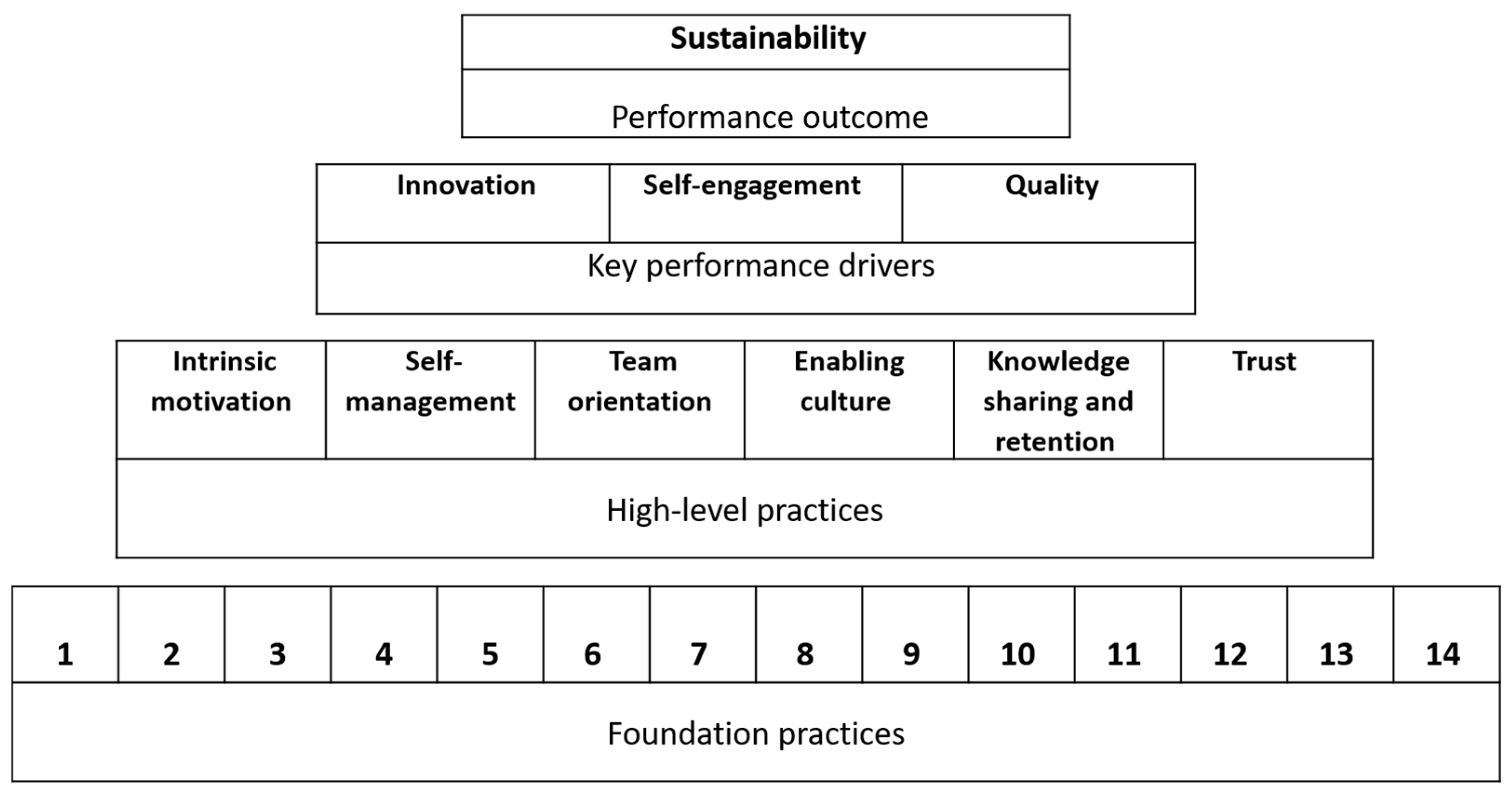
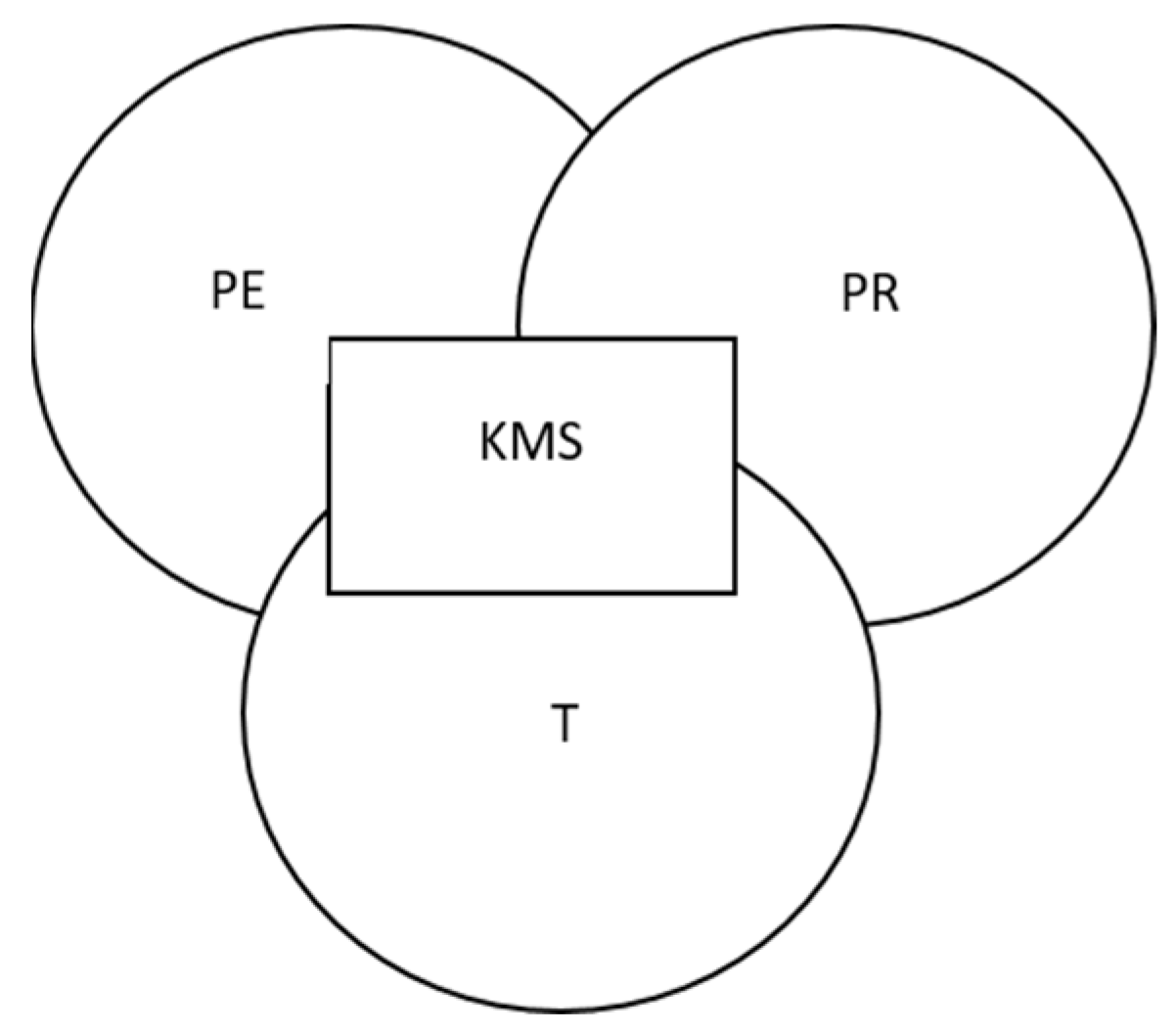
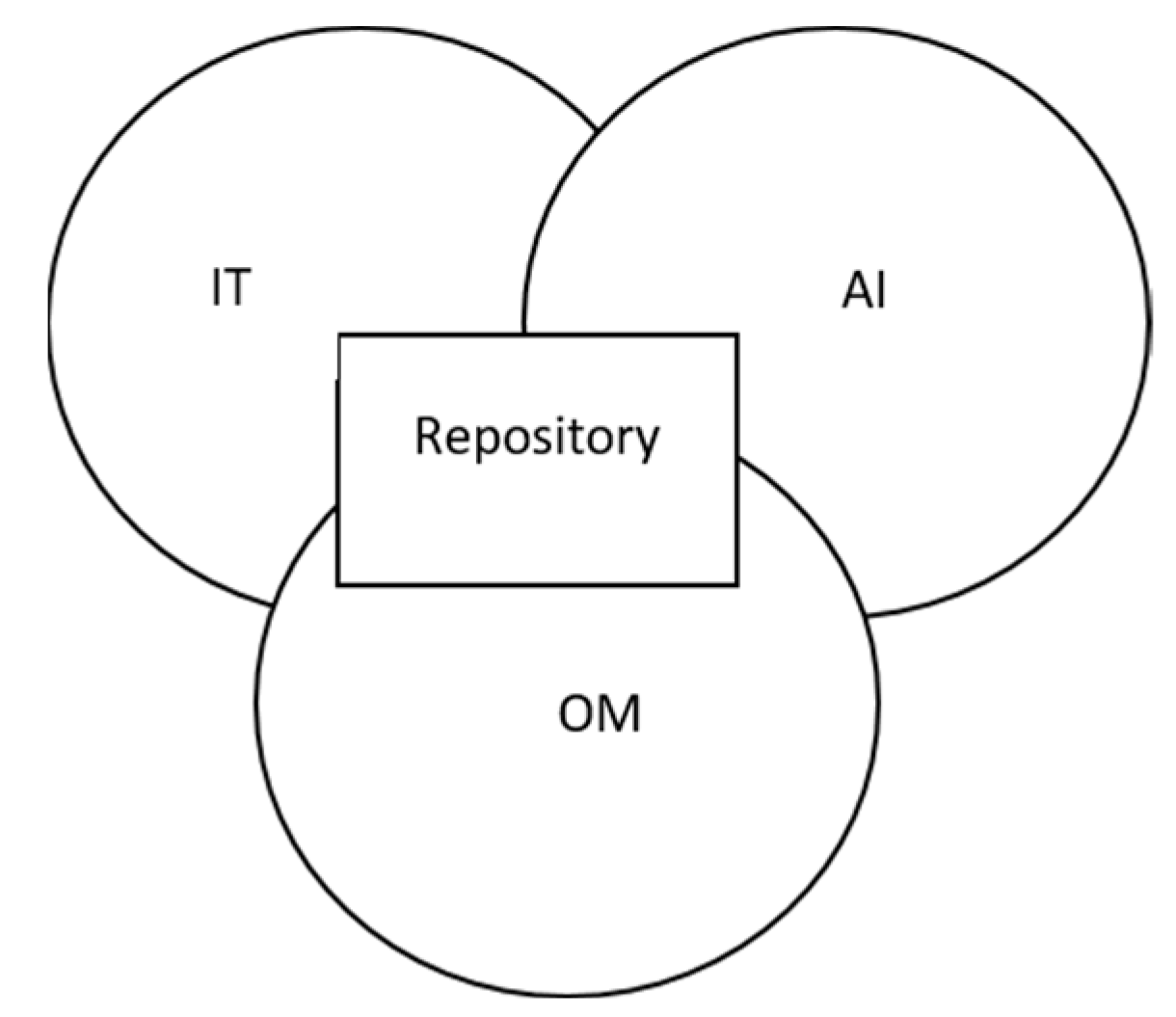
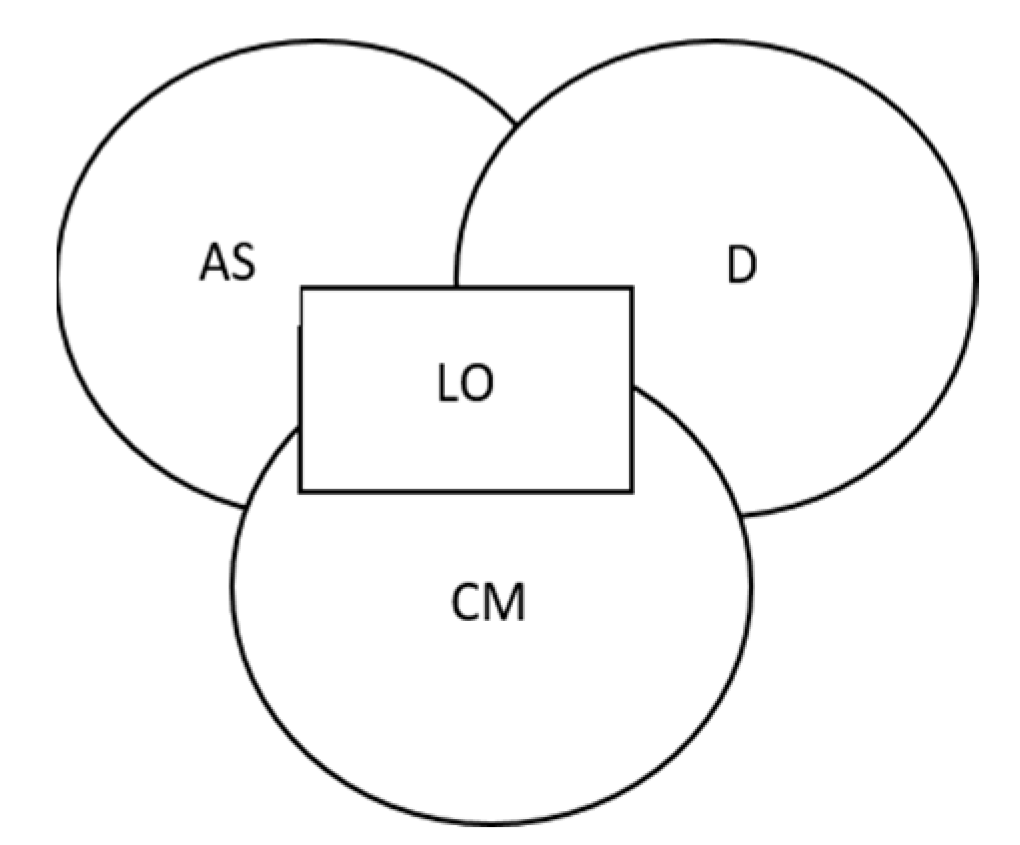
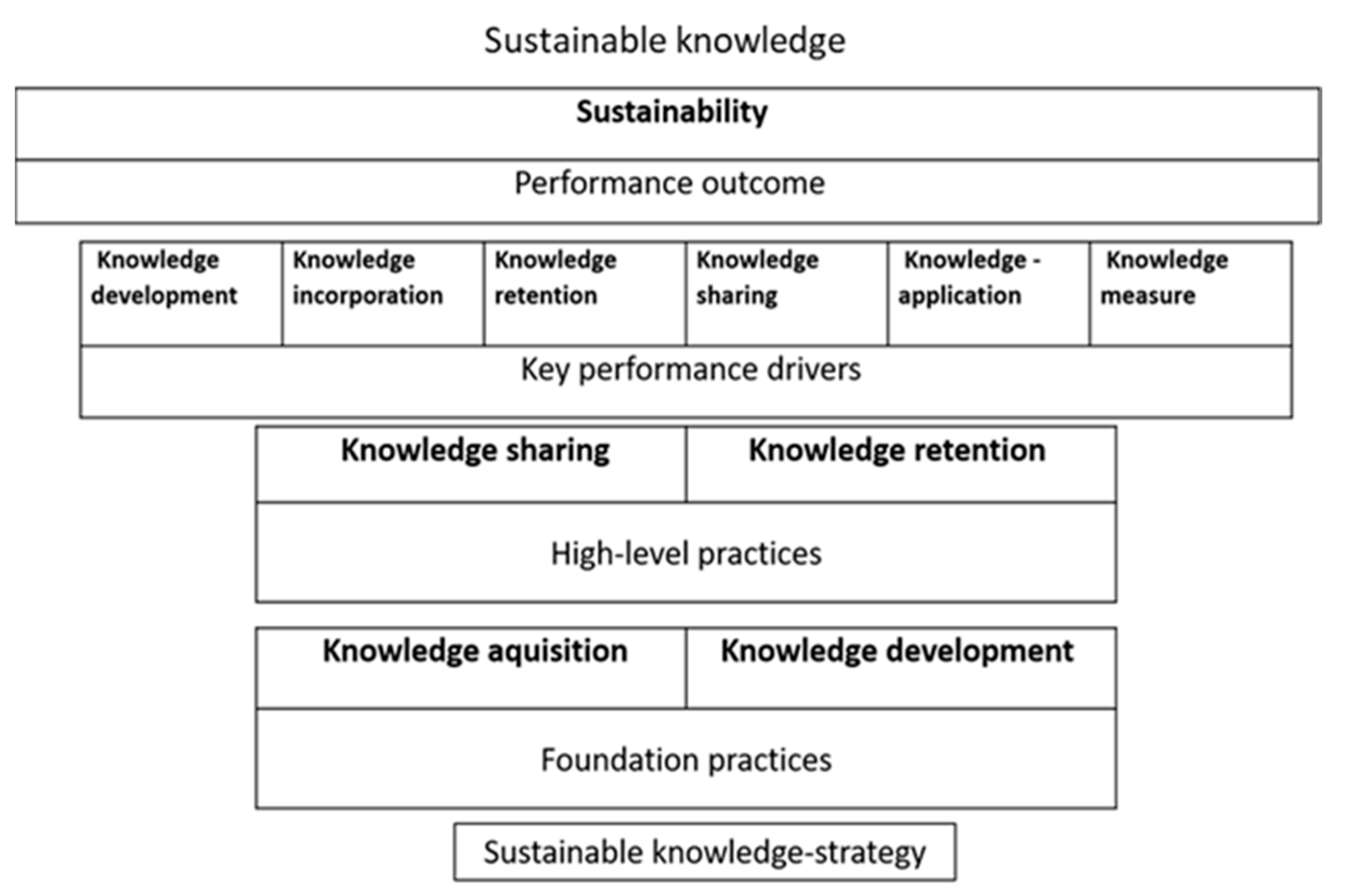
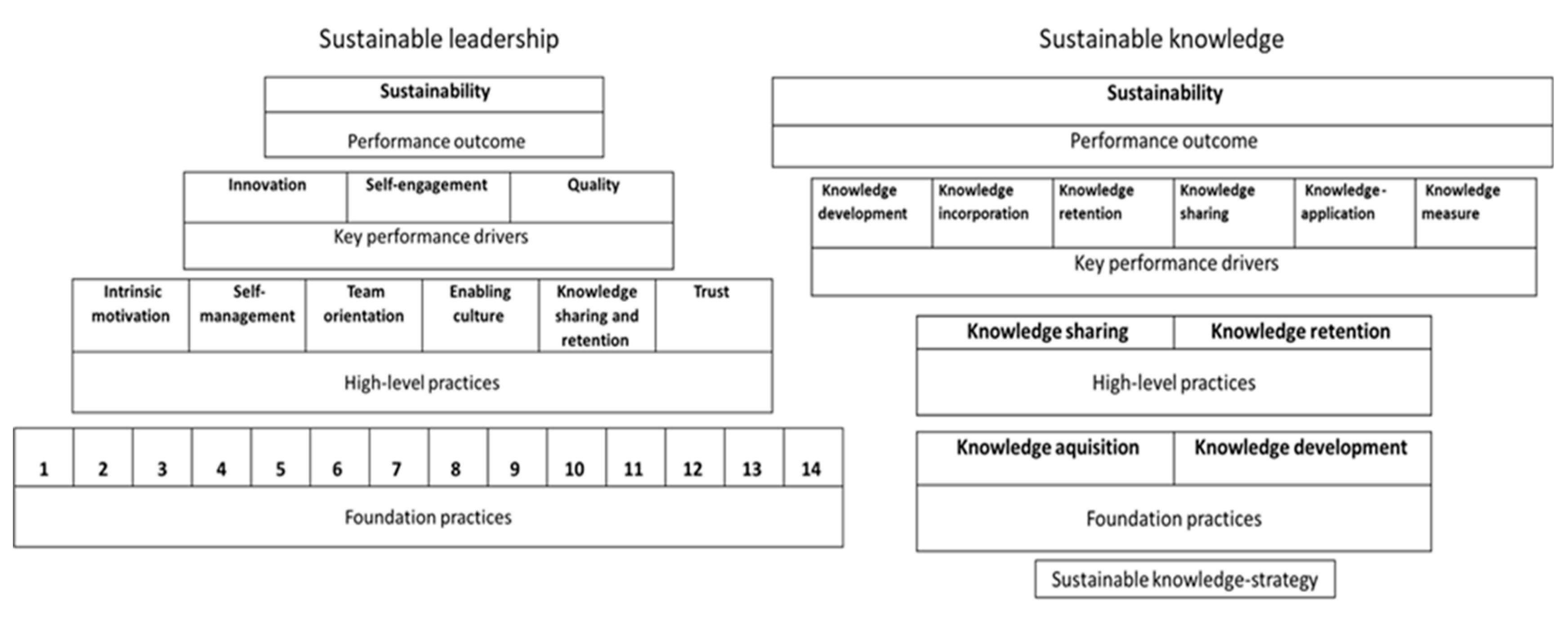

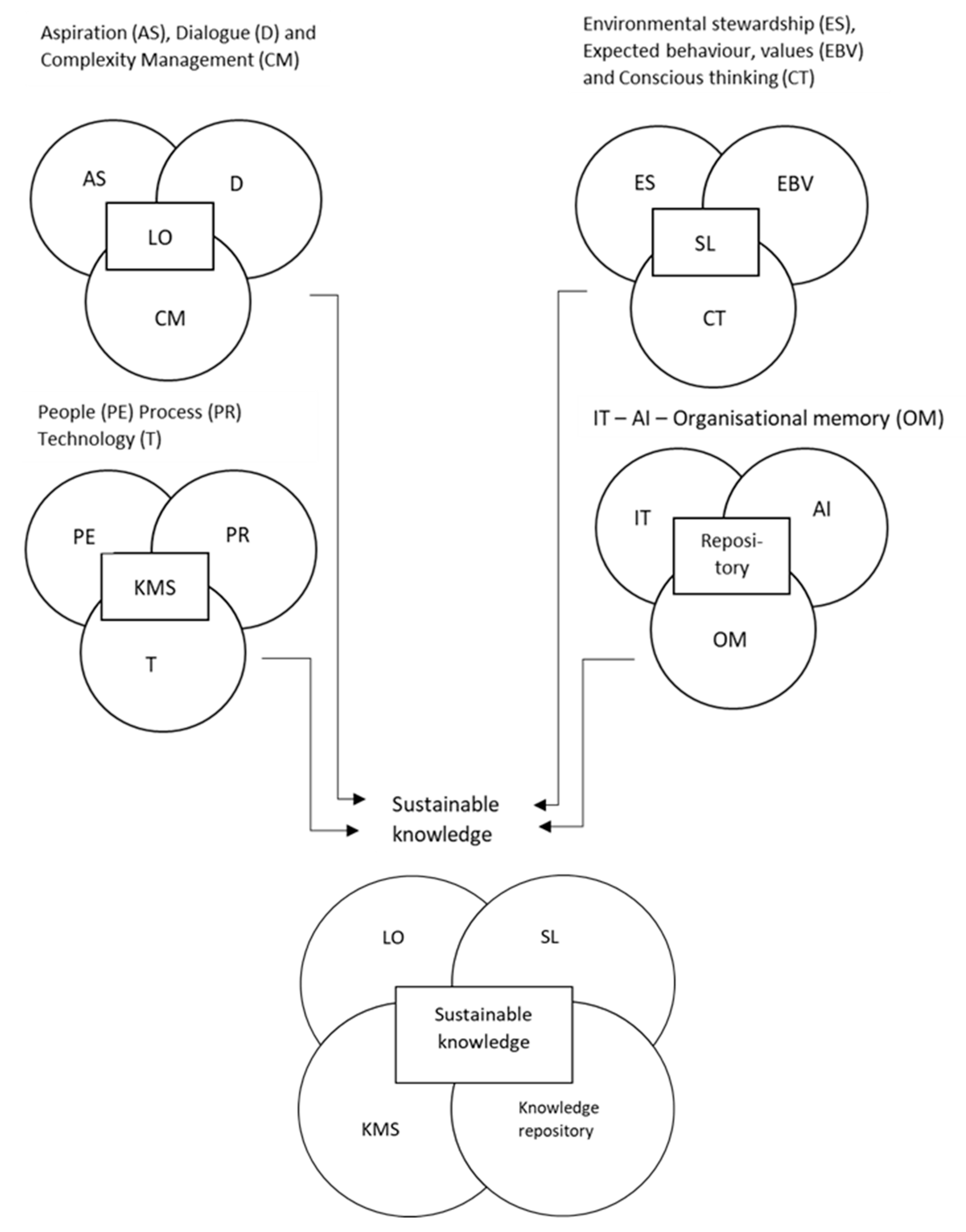
| Elements of Sustainable Management | Concepts Used in Economics and Business |
|---|---|
| Context | Recognition of interdependence; complexity; ambiguity; interconnectedness; resource constraints; regulators; megatrends |
| Consciousness | Mindsets; world views; beliefs; mental models; attitudes |
| Continuity | Long-term horizon; courage; strength; common purpose; centrality; change processes |
| Relatedness | Serving the needs of all stakeholders; influencing in the long and short term; cooperation; trust; fairness; altruism; kinship; needs rather than wants |
| Creativity | Innovation for sustainable shared value creation; sustainable business models; new value measurement models; flow |
| Collectivity | Increasing collective impact; embedding sustainability in business. structure; sustainable consumption |
| Elements of Sustainable Leadership | Characteristics of a Learning Organisation | Steps in the Knowledge Management Process |
|---|---|---|
| Foundation practices | ||
| Appropriate leadership culture/style | x | |
| Talent recruiting & retaining staff | x | |
| Developing people continuously | x | |
| Internal succession planning | x | |
| Respect, diversity & inclusion | x | |
| Ethics and virtues | x | |
| Good governance & accountability | x | |
| Long-term horizon | x | |
| Considered organisational change | x | |
| Independence from outside interference | x | |
| Environmental responsibility | x | |
| Social responsibility | x | |
| Broad stakeholder focus | x | |
| Strong shared vision and purpose | x | |
| High-level practices | ||
| Intrinsic motivation | x | |
| Self-management | x | |
| Team-orientation | x | |
| Enabling culture | x | |
| Knowledge retention and sharing | x | |
| Trust | x | |
| Key performance drivers | ||
| Innovation | x | |
| Staff engagement | x | |
| Quality | x | |
| Performance outcome | ||
| Sustainability | x | x |
Publisher’s Note: MDPI stays neutral with regard to jurisdictional claims in published maps and institutional affiliations. |
© 2022 by the author. Licensee MDPI, Basel, Switzerland. This article is an open access article distributed under the terms and conditions of the Creative Commons Attribution (CC BY) license (https://creativecommons.org/licenses/by/4.0/).
Share and Cite
Bencsik, A. Background on the Sustainability of Knowledge. Sustainability 2022, 14, 9698. https://doi.org/10.3390/su14159698
Bencsik A. Background on the Sustainability of Knowledge. Sustainability. 2022; 14(15):9698. https://doi.org/10.3390/su14159698
Chicago/Turabian StyleBencsik, Andrea. 2022. "Background on the Sustainability of Knowledge" Sustainability 14, no. 15: 9698. https://doi.org/10.3390/su14159698
APA StyleBencsik, A. (2022). Background on the Sustainability of Knowledge. Sustainability, 14(15), 9698. https://doi.org/10.3390/su14159698





